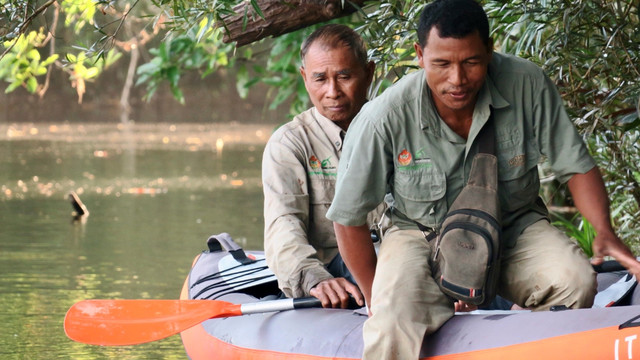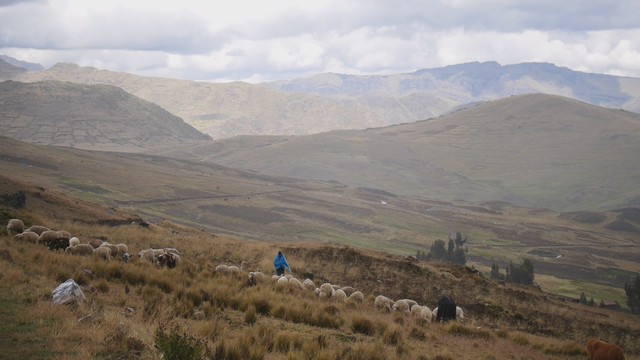To save Africa's wildlife, conservation needs a radical shake-up
To mark World Wildlife Day on 3 March, Dilys Roe and James Mayers highlight that, despite over 100 years of international investment in conservation in Africa, wildlife is in serious trouble. Clearly, conservation needs a rethink.



Lions on the move in the Okavango Delta, Botswana. While populations of lions have increased by 12% in four countries, including Botswana, studies show a 43% overall decline from 1993-2014 (Photo: Barrett, CC BY-NC-ND 2.0)
Breathtakingly beautiful animals living peacefully alongside people in picturesque African habitats – that's the dream. But despite more than 100 years of international investment in conservation in Africa, wildlife – one of the continent's greatest assets – is in serious trouble.
With huge numbers of species dramatically declining over the last 50 years, World Wildlife Day (3 March) is a reminder that, to turn things around, conservation needs to change.
Lion populations alone have dropped by 40 per cent in two decades. And from 1970 to 2005, 69 key African mammal species declined by 59 per cent.
Efforts to tackle poaching have dominated the struggle to save wildlife. But, although a contributor to the problem the focus on poaching masks a bigger problem. The biggest driver of wildlife loss – for lions, elephants and a host of other species ― is land. Wildlife is losing space to agriculture, infrastructure and urbanisation.
Wildlife is valuable both to maintaining ecosystems and economically. Lions and other predators keep herbivore populations under control preventing overgrazing of fragile grasslands. Some forest tree seeds rely on passing through an elephant's gut to germinate and to be dispersed.
Forests and other ecosystems maintained by wildlife are crucial to absorbing carbon, protecting watersheds, soil fertility and more. Economically, Kenya's Mau Forest for example, benefits the country's economy by US$1.3 billion a year, and the tea industry by $163 million a year, primarily from its ability to catch, store and distribute water. And the legal, sustainable trade in wildlife is worth $340 million a year to Southern Africa (PDF) alone.
The role of trophy hunting in local economies
Viewing wildlife is one of the tourism industry's fastest growing activities – tourism in Africa has grown by over 6 per cent a year since 2005, and in 2013 was conservatively valued at $34.2 billion. And although controversial, trophy hunting plays an important role in local economies, particularly in areas not suitable for tourism. It creates jobs, generates income and meat, and ensures large areas of land are maintained for wildlife.
Beyond this, iconic African wildlife is highly valued, revered even, for its sheer existence. It is often intricately entwined with local culture and wildlife loss can also mean the loss of cultural ties.
The poaching crisis has stimulated a huge rise in funding for African wildlife conservation. The World Bank estimates over $1.3 billion was invested globally in tackling illegal wildlife trade between 2010 and 2016. Most has been invested in protected area management and law enforcement. But the focus on fences, fines and guns has, in many places, led to human rights abuses, restricted people's livelihoods and caused local people hardship.
A fundamental problem is that those in the best position to preserve wildlife – local communities – lack incentives to do so. To turn things around, wildlife management must become a viable option for them.
If conservation is finally to be effective it needs to benefit wildlife and local people (PDF). Too often national and international policy restrict local people's rights to use and manage wildlife to such an extent that it leaves them with little or no economic benefit.
Laws need to be created that establish clear, enforceable rights enabling communities to sustainably use, manage and benefit from conservation and wildlife. It is crucial local people have a voice in shaping conservation policies. African civil society needs to be able to hold politicians to account and mobilise relevant constituencies.
Tourism, often heralded as a panacea for conservation and for local jobs and income, is only possible in some places and at certain times. As lion conservationists agree, well-managed trophy hunting can be an effective complement, but it is frequently under fire from animal welfare organisations. Exploration of, and investment in, alternatives that can generate conservation incentives for local people is urgently needed.
But the benefits of conservation need to be shared more fairly. Financially governments, private tour operators, lodges and the global public are currently the main beneficiaries – not local communities. Local people often bear significant costs, particularly in the form of restricted access to or physical eviction from conservation areas, and conflict with wildlife, which may eat or trample crops, destroy property, or kill livestock or people.
The myth of the 'Garden of Eden'
Innovative strategies to prevent or reduce human-wildlife conflict are constantly emerging but more mechanisms are needed to compensate people for the costs they bear.
What is really needed for the long-term survival of Africa's wildlife is the development of policies and partnerships, which foster as well as recognise communities' rights and needs. The 'Garden of Eden' image of Africa is a myth – people and wildlife do not live in splendid isolation and nor should they.
Africa's wildlife will have a more hopeful future when we start supporting local people and stop criminalising them. Then they can help protect the wildlife we all treasure.
Dilys Roe (dilys.roe@iied.org) is principal researcher and team leader (biodiversity), and James Mayers (james.mayers@iied.org) is director of IIED's Natural Resources research group.



